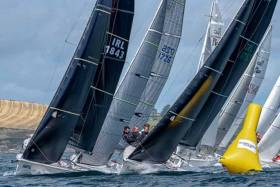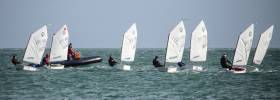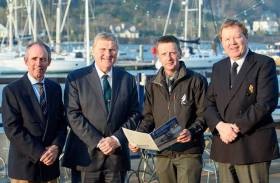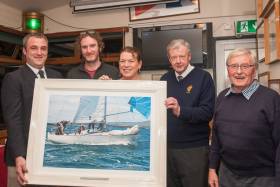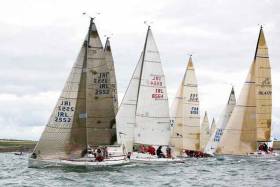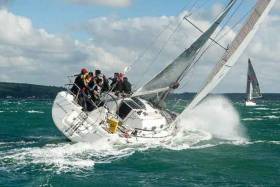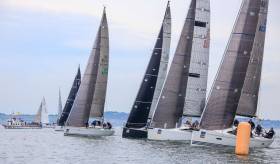Displaying items by tag: Royal Cork Yacht Club
ICRA Sponsor Offers 'Free Model Truck' As Entry Incentive for Royal Cork National Championships
As ICRA ramps up its promotion for the Cruiser–Racer National Championships at Royal Cork Yacht Club in June, fleet sponsor WD40 is offering a free 'collectors item' model truck to the next six entries received.
The RCYC entry list is certainly hotting up. 2016 ICRA National Class Champions Jump Juice, Joker II, Checkmate XVII and Cartoon will all be back defending their national titles in Crosshaven in June.
Red more about how the coming season is shaping up in Class zero and one here and class two here.
Enter online for the ICRA Nats here.
Sailing with Dutch sail numbers Anthony O'Leary has won all six races of the Sportsboats April League at Royal Cork Yacht Club writes Bob Bateman.
Sailing a 1720, the former Afloat Sailor of the Year leads Cork Harbour club–mates Clive O' Shea and Tom Durcan in another of the Royal Cork's own 1720 designs.
Third in the seven–boat fleet is a J80, Rioja, sailed by Ernie Dillon and Dominic Baxter. Full results downloadable below.
Five Irish Optimist sailors were in the top five of the UK's Spring Championships last weekend. IOCA UK and The Royal Torbay Yacht Club hosted IOCA UK's first championship of the year in Torquay.
119 sailors competed in the main fleet over the two days, including a team of 24 sailors from Ireland. The sailing conditions were deemed "exceptionally tricky", with gusts of over 25 knots and waves of up to two metres.
Overall winner was Jamie Cook of Cardiff Bay Yacht Club, winning five out of the six races, followed by Finley Dickinson in 2nd place and William Pank in 3rd place. Top girl was India Page-Wood in 5th place. First Junior was Luke Turvey from Ireland, who finished a respectable 20th overall.
Top Irish boat was Justin Lucas of Royal Cork in eigth place and his clubmate Killian O'Regan was ninth. Full results are here.
Jamie Cook said: "It's nice to do more events on the sea in a great venue like Torbay and the conditions were awesome. I think that the sea is the best place to sail. It was a good weekend and hope to sail there again soon."
29 regatta fleet sailors completed 10 races over the weekend with Noah Evans from Royal Victoria Yacht Club finishing in 1st place.
IOCA's Claire Mueller added: "A special mention must also be made of Michael Crosbie from Royal Cork Yacht Club, who finished in 15th place and was competing in his first major competition since breaking both legs last year. Well done Michael." In recognition of this achievement Michael received a sailing watch from one of IOCA UK's class sponsors IBI Sailing.
2017 is a special year for IOCA UK, as it has recently been announced it will host a Champion of Champions Race at its 2017 British Nationals in celebration of 70 years of the Optimist Dinghy. To be held at the Weymouth and Portland National Sailing Academy, those battling it out for the ultimate glory will be past National Optimist Champions, Olympic sailors, Optimist coaches and the top current sailors.
ICRA Nationals Launched in Royal Cork Yacht Club
A full programme of races for nine national titles at this year's ICRA National Championships was launched this week at the Royal Cork Yacht Club by Minister Simon Coveney.
Admiral John Roche and ICRA Chairman Simon McGibney were also present as was newly elected ISA President Jack Roy. The national event will be held in the Crosshaven club from Friday June 9th to Sunday June 11th and will be officiated by international race officers Jack Roy, Alan Crosbie and Peter Crowley.
Minister Coveney spoke of his delight in seeing Crosshaven and Kinsale (Sovereigns Cup) hosting major sailing events this summer and he wished both clubs every success. He encouraged all sailors to partake in the regattas and keep the sport at the forefront of the international sailing calendar which in turn will bring visitors from overseas and other Irish ports to the local area.
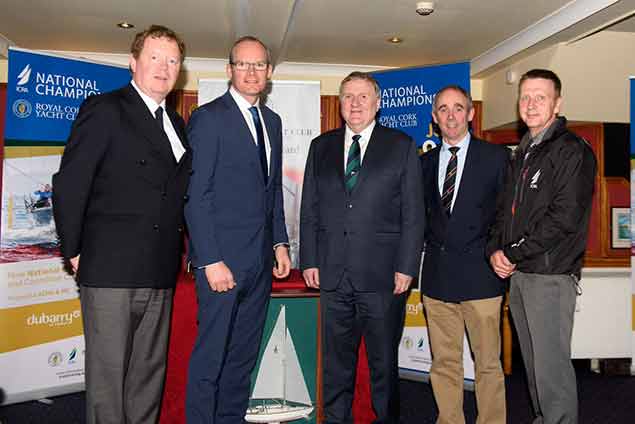 ICRA Champs launched – Royal Cork Admiral John Roche with Minister Coveney, ISA President Jack Roy, Event Chairman Paul Tingle and ICRA Commodore Simon McGibney. Photo: Bob Bateman
ICRA Champs launched – Royal Cork Admiral John Roche with Minister Coveney, ISA President Jack Roy, Event Chairman Paul Tingle and ICRA Commodore Simon McGibney. Photo: Bob Bateman
Royal Cork Admiral John Roche thanked event chairman Paul Tingle and his committee for running the event on behalf of the club and wished them every support and success.
Entry to the ICRA National Championships is now available on-line (royalcork.com and cruiserracing.ie) with a very reasonable entry fee of €150 per boat.
Royal Cork Yacht Club got an idyllic day for its fourth Horizon Energy PY 1000 event with sun and eight knots of breeze with spells of about 10 writes Bob Bateman.
42 boats entered but 50 were counted on the startline.
Entries included Nat 18s Rs 400 and 200, RS Fevas,Lasers all rig sizes, Toppers Vago, Europe, 49er, 29er, and an Omega. A welcome visitor Simon Crowe and his daughter Ella Rose travelled from Villiarstown. The winner of the first prize was youth champion Johnny Durcan in a Laser Radial.
The wind was from the east and so a windward leeward course of four rounds was set in front of the clubhouse on the Owenabue river. Race Officer John Crotty got the fleet away with just an individual recall.
SCORA Honours Memory of Sailing Journalist Claire Bateman
The South Coast Offshore Racing Association (SCORA) honoured Claire Bateman at its annual general meeting held in the Royal Cork Yacht Club last night writes Tom MacSweeney. Claire, who died last year, was a stalwart of sailing journalism for Cork Harbour and coastal racing sailors. Her coverage of cruiser and dinghy racing was comprehensive and her dedication to the sport charted its development. With photographer husband, Bob, the couple were ever-present at sailing events. Their coverage spanned from major events to the smaller ones, providing an unrivalled level of sailing reportage on Afloat.ie in national and local media and was the foundation of the RCYC website.
Members expressed appreciation of the dedicated work which Claire had done for sailing, as she was remembered by the presentation of a memorial award to the “most enthusiastic boat in SCORA.” This was a photograph of the winning boat, Dave Lane and Sinead Enright’s J24 ‘Ya Gotta Wanna’.
Making the presentation Claire’s son, Rob, recalled how his mother had been encouraged by well-known Cork Harbour sailor Michael Wallace into the role which she adopted with the dedication and commitment which marked her approach to whatever task she undertook.
That commitment benefited sailing for very many years and was much appreciated by SCORA sailors. Her death has been a huge loss to the sport.
Her husband, Bob’s photography, once again recorded the success of the top sailors in SCORA whose awards for their victories during the season, presented at the AGM, were framed photographs of their boats in racing action. Taken by Bob, these are treasured prizes. He continues the work of recording sailing and racing in Cork.
The newly-elected SCORA Commodore, Kieran O’Connell, is Rear Admiral for Keel Boat Racing at the RCYC.
There was a big attendance at the annual meeting which agreed that a review of SCORA and its racing programme was needed. This follows a year when “SCORA dropped off the map” the members were told. More co-operation between South Coast clubs is needed, delegates agreed, with an emphasis on “bringing the fun back into sailing”.
Falling numbers participating in events and the urgent need to change that, by bringing newcomers into the sport, particularly younger people, were identified as crucial issues.
It’s the peak of the best of the sailing season in the Caribbean, and key Irish crews are making a major impact at the sharp end of the fleet writes W M Nixon. Former All-Ireland Sailing Champion Nin O’Leary of Crosshaven, skippering the 60m sloop Perseus3 of Mark Byrne (a Royal Cork YC overseas member), has recorded a convincing class win at the Loro Piana Caribbean Superyacht Regatta & Rendezvous, an event so discreet that the precise location is really known only to the participants on the 23 superyachts taking part.
Cork interest in Perseus3 goes beyond the owner and crew, as she is a classic Ron Holland design, a Perini Navi 60. She’s a soncey big animal, even by superyacht standards. Those comfort-loving sailors who get their kicks out of being competitive with a properly-tuned standard cruiser in handicap racing will be fascinated by what’s needed to keep Perseus’s many tonnes of luxury sailing at optimum performance. But Nin O’Leary clearly has what it takes, as this is the first time Perseus has recorded wins.
It takes rare skill, very fine judgement in tight situations where a mistake could cost the equivalent of a small nation’s annual GDP, and a very large crew who know what they are doing, for with the enormous loads that you get on rigging, halyards and sheets on a boat this size, the slightest mistake can result in serious injury or worse.
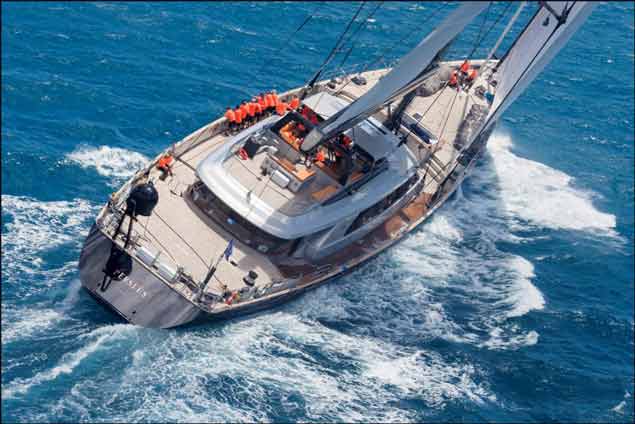 Ron Holland, formerly of Crosshaven and Kinsale, was involved in the creation of Perseus
Ron Holland, formerly of Crosshaven and Kinsale, was involved in the creation of Perseus
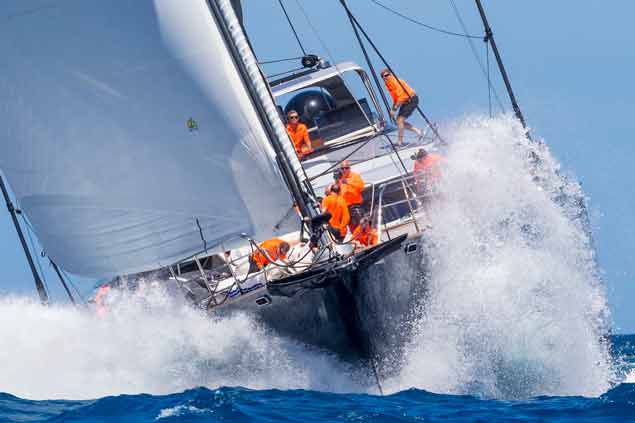 Comin’ atcha….that’s an awful of very expensive boat to be racing on port tack
Comin’ atcha….that’s an awful of very expensive boat to be racing on port tack
But when it goes right, this is very rewarding sailing indeed, and the crew of Perseus – whose Cork complement also included RCYC members Clive Higgins and James Fagan – overcame problems to with one of the roller-furling systems during one contest to record a clean scoresheet of three wins.
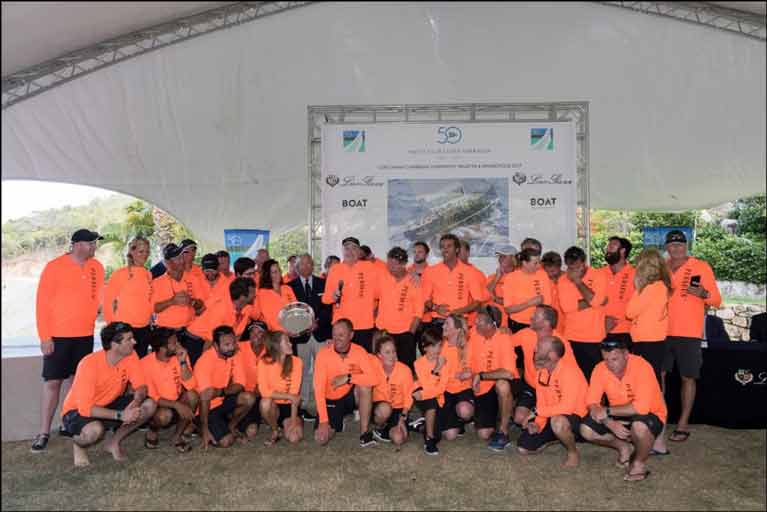 How many does it take to race a boat of this size and type? You count….but that’s Nin O’Leary in the middle, right under the photo of the boat
How many does it take to race a boat of this size and type? You count….but that’s Nin O’Leary in the middle, right under the photo of the boat
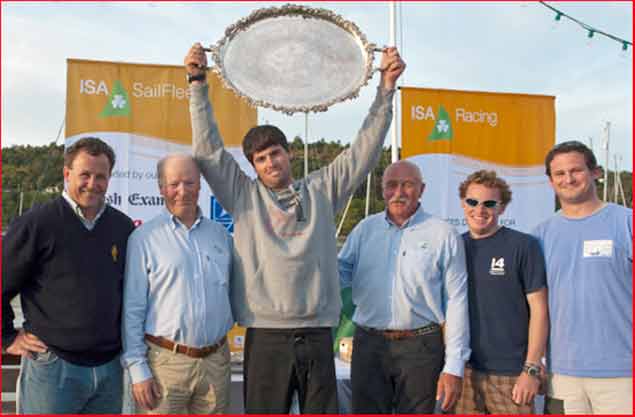 Back in the day….Nicholas “Nin” O’Leary wins the Helmsman’s Championship at Royal Cork in 2009
Back in the day….Nicholas “Nin” O’Leary wins the Helmsman’s Championship at Royal Cork in 2009
Half–Tonners, Sigma 33s, X302s, J97s & Corbys Mean ICRA Class Two Title Is Wide Open
Class Two is certainly heating up and expanding this year writes Dave Cullen, Skipper of championship winning half–tonner Checkmate XV. The quality of the fleet must make it one of the most competitive with boats ranging from €15k to €150k all in with a fighting chance of the podium.
At the bottom of the rating band, Sigma 33s make up the numbers and the top end is dominated by J97s and Elan 333s.
Such are the numbers that a number of boats might find themselves unhappy participants in Class One which happened in Sovereigns Cup two years ago.
The fleet is diverse and includes a sizeable X302 fleet from Howth YC including the stalwart podium winner DUX, Maximus and Viking to name but a few.
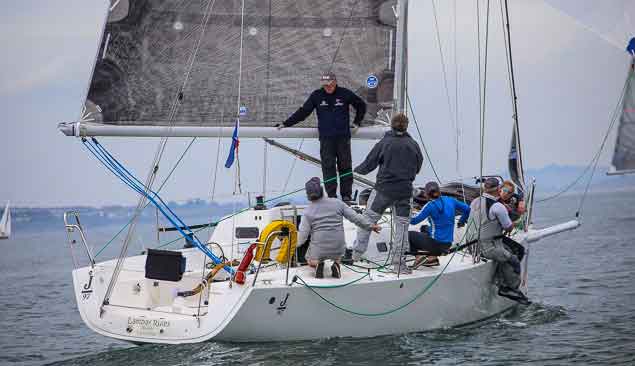 Stephen Quinn’s J/97 Lambay Rules is at the top of the Class Two Rating Band Photo: Afloat.ie
Stephen Quinn’s J/97 Lambay Rules is at the top of the Class Two Rating Band Photo: Afloat.ie
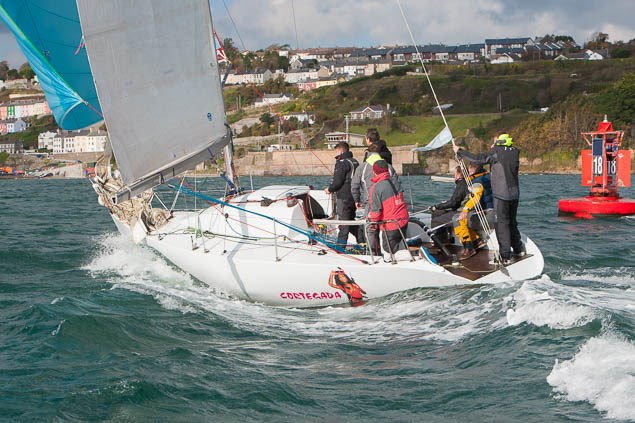 Cork's George Radley adds his latest 'half' Half Tonner Cortegada to the Class Two fleet this season. Photo: Bob Bateman
Cork's George Radley adds his latest 'half' Half Tonner Cortegada to the Class Two fleet this season. Photo: Bob Bateman
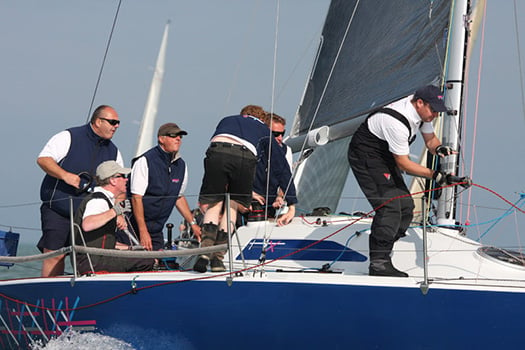 David Cullen's Checkmate from Howth Yacht Club is the 2015 Half Ton champion
David Cullen's Checkmate from Howth Yacht Club is the 2015 Half Ton champion
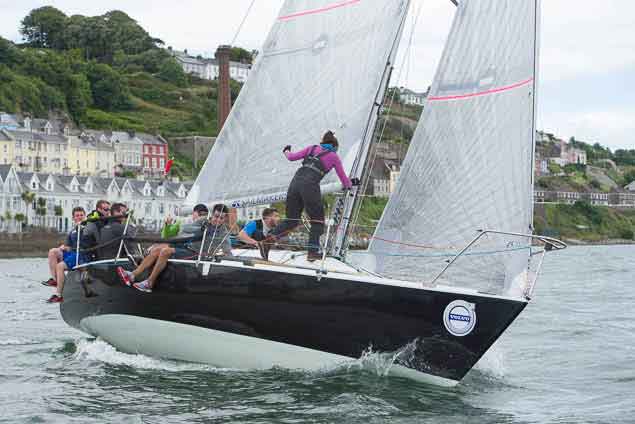 Popular Half tonner Harmony from Howth (Jonny Swan) is on the Class Two circuit Photo: Bob Bateman
Popular Half tonner Harmony from Howth (Jonny Swan) is on the Class Two circuit Photo: Bob Bateman
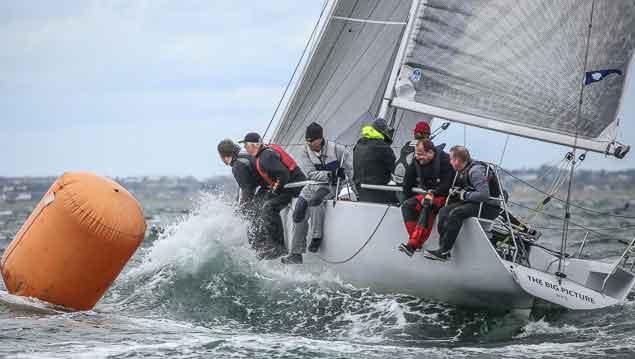 Another quality Half tonner campaign from HYC, The Big Picture (Michael and Richard Evans). Photo: Afloat.ie
Another quality Half tonner campaign from HYC, The Big Picture (Michael and Richard Evans). Photo: Afloat.ie
The Half Ton class is formidable and apart from the locals of Checkmate XV, Harmony, King One and The Big Picture, visiting boats planning on basing campaigns here include Nigel Biggs latest Checkmate XVIII ex Dick Dastardly, Paul Wayte from Swansea's HB31 Headhunter and the highly optimised Miss Whiplash returns to Dublin owned by Paul Pullen visiting from Swansea. Demolition from Falmouth is also likely to appear. George Radley adds his latest 'half' Cortegada to the pile of quality competitors.
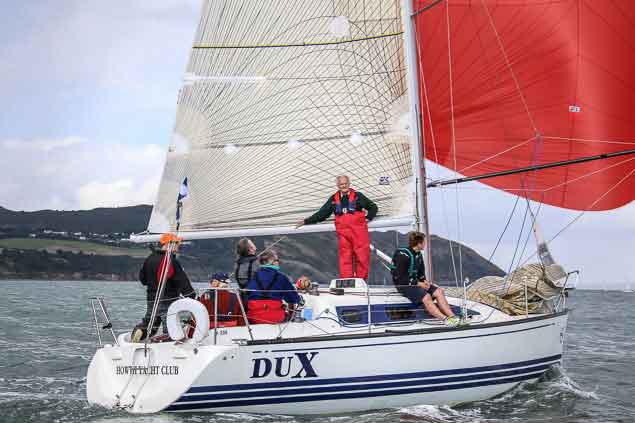 The X302 fleet from Howth YC includes stalwart DUX Photo: Afloat.ie
The X302 fleet from Howth YC includes stalwart DUX Photo: Afloat.ie
Throw in DB1s, J80s, Corby 25 & 26s and the start line really shapes up with a sharp competitive fleet.
It's easy to predict the half tonners as dominating with light to medium conditions suit them for sure. The same applies with the Corbys. Throw in an extra few knots and the X302s pick up their heels as do the Sigma 33s which are never too far behind. Movistar Blue and Lambay Rules like a breeze too so the field is really wide open.
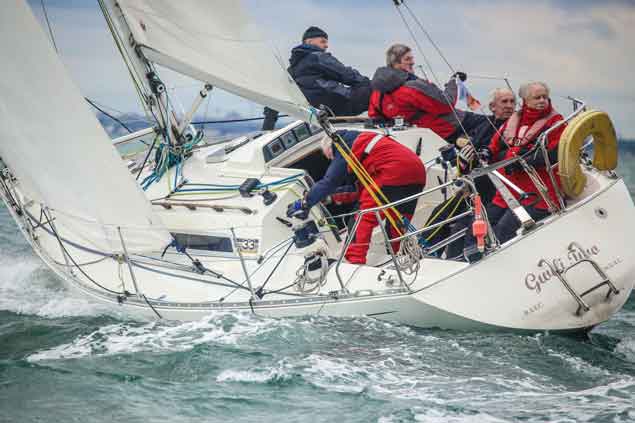 The Sigma 33 class, formerly a stand alone one design class, have joined DBSC Cruisers Two division this year, boosting numbers on Dublin Bay to 19 Photo: Afloat.ie
The Sigma 33 class, formerly a stand alone one design class, have joined DBSC Cruisers Two division this year, boosting numbers on Dublin Bay to 19 Photo: Afloat.ie
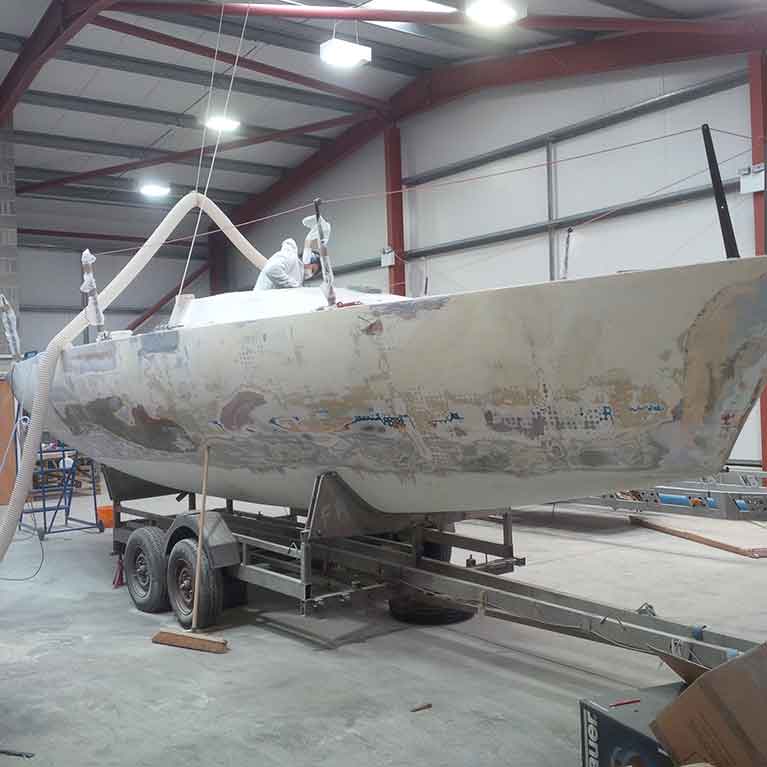 Checkmate XVIII – the old Emiliano Zapata, ex Dick Dastardly, ex French Beret, ex Concorde from 1985 is undergoing a refit in North Wales, launching early May
Checkmate XVIII – the old Emiliano Zapata, ex Dick Dastardly, ex French Beret, ex Concorde from 1985 is undergoing a refit in North Wales, launching early May
On Dublin Bay, there will be a reported 19 boats in this year's DBSC Cruisers two fleet boosted by eight Sigma 33s who join the division.
As to predictions, any of the boats in the class can win but need to arrive on the line in good shape and well prepared. Rub your hand over the bum of any of the Class leaders and you will see the efforts put in as the best winning ingredient for race wins is boat speed.
I think a prediction is futile without a weather forecast so I would say for lighter traditional Dublin summer conditions, any of the half tonners or the Corby 25 will feature in a windward–leeward race, Lambay Rules (J97) prefers a reach round the cans races whilst a well sailed Sigma 33 has a real chance if they can stop the mighty Dux in breezy conditions.
Having answered the question like a politician would, if it was predictable none of us would bother, so place your bets and see how it fared out in October. I'll put a tenner on Biggsy though!
Dave Cullen of Howth Yacht Club is Skipper of Half–Tonner Checkmate XV and won the 2015 Half Ton Classics Cup with a race to spare
SCORA AGM To Hear Proposal For Better Collaboration Between South Coast Sailing Clubs
Topics for discussion at next week's SCORA AGM and Presentation of overall prizes is a proposal for better collaboration between the local South Coast Clubs, which may help address the twin problems of falling fleet numbers and the poor number of youth dinghy sailors progressing to the cruiser scene.
The AGM will be held at the Royal Cork Yacht Club next Wednesday March 15th at 7.45pm.
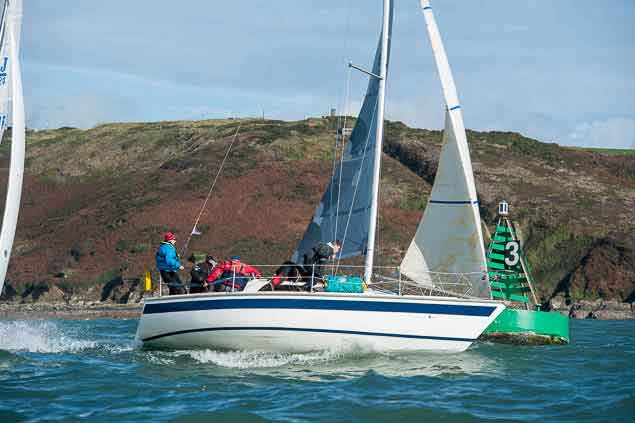 Judy Mc Grath's Impala 'Bonanza' with Barry Rose on the helm, rounds Cork Harbour's number 3 buoy
Judy Mc Grath's Impala 'Bonanza' with Barry Rose on the helm, rounds Cork Harbour's number 3 buoy
Several programmes were discussed at the recent ICRA conference and it is hoped to outline the various incentives available, which include cruiser training grants and the development of a new crew training curriculum.
A review of the current IRC class bands will take place with any possible alterations for the 2018 season.
The class winners of the overall SCORA league will be presented with a pictorial record, photographed by Afloat's Bob Bateman, at the various club events during the 2016 season. See a sample gallery below.
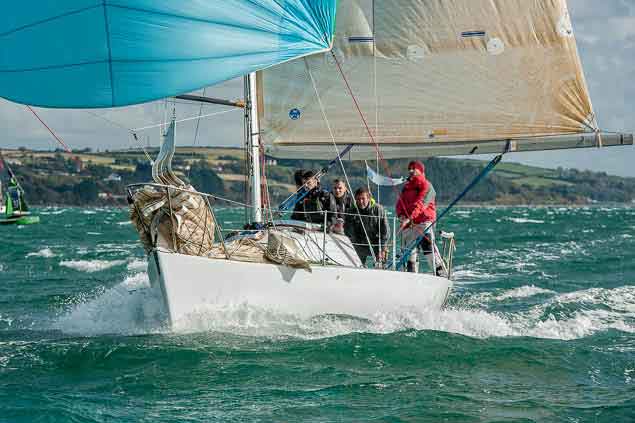 George Radley's half–tonner 'Coregada' finished third in IRC class two in SCORA overall and won IRC class 2 in CH Marine Autumn League
George Radley's half–tonner 'Coregada' finished third in IRC class two in SCORA overall and won IRC class 2 in CH Marine Autumn League
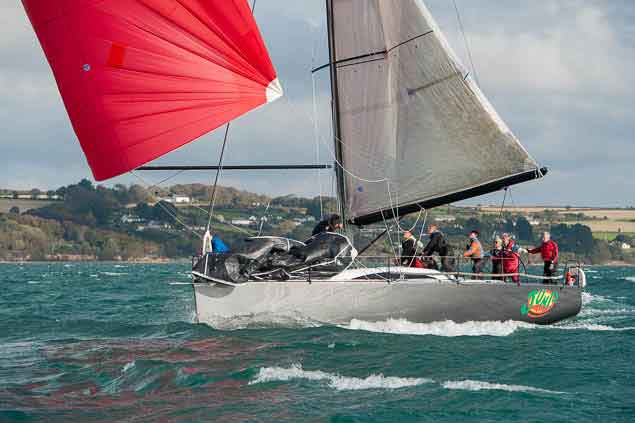 Jump Juice (Conor Phelan) in breeze
Jump Juice (Conor Phelan) in breeze
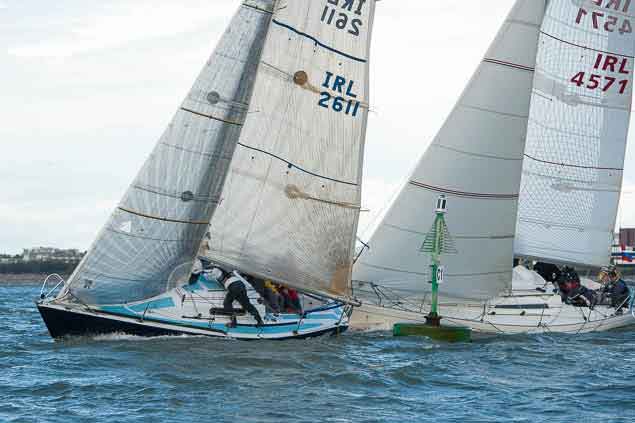 Quarter Tonner Bandit (IRL 2611) leads the Sigma 33 Flyover
Quarter Tonner Bandit (IRL 2611) leads the Sigma 33 Flyover
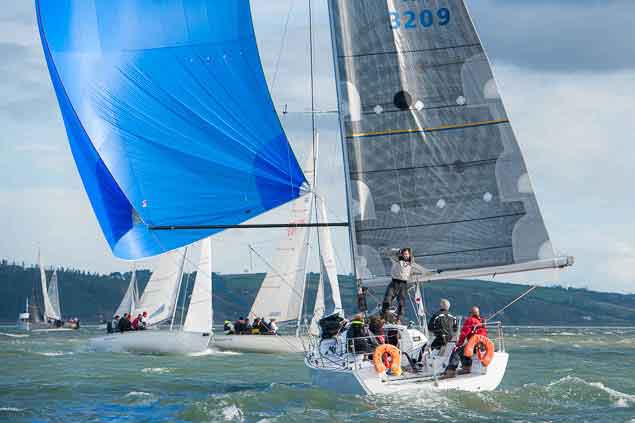 Frank Doyle's A35 Endgame, helmed here by Amy MacCarthy
Frank Doyle's A35 Endgame, helmed here by Amy MacCarthy
Crew number limits or crew weight limits at this year's ICRA National Championships are under review following discussion at last weekend's ICRA Conference in Limerick where it was shown different regattas deal with crew weight limits in different ways.
The focus of conversation, under guest speaker Mike Urwin of the RORC, was the disposal of crew limits at events such as the ICRA National Championships.
The 2017 ICRA Notice of Race states 'IRC Rule 22.4 will be deleted'. This rule says: “The Crew Number printed on each boat’s certificate shall not be exceeded or the crew weight shall not exceed 85kg multiplied by the Crew Number printed on the certificate.”
As the rule does not apply at the ICRAs, boats have an option to take less crew on a light wind day and stack the rail in breeze.
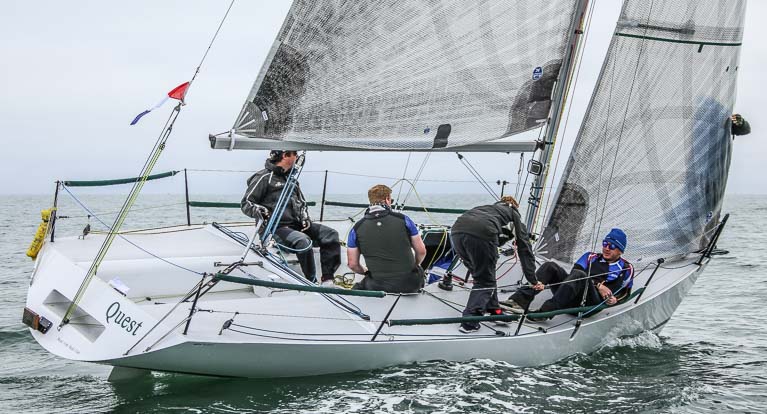 The Quarter tonner Quest in light air mode for the 2016 ICRA Championships at Howth. Photo: Afloat.ie
The Quarter tonner Quest in light air mode for the 2016 ICRA Championships at Howth. Photo: Afloat.ie
Traditionally, fun regattas like Calves Week, did not have crew limits, so that late crew members could be recruited from the quayside and children could also be accommodated as required.
The move to delete the limit rule followed significant consultation with sailors and ICRA surveys found overwhelming support for its withdrawal.
However, the meeting heard that for 'serious regattas', such as a national championships, not having a crew limit can lead to advantages to those who bring a large crew pool to an event, thus upping overall costs of participation.
Some delegates believed championships should stick to the IRC certificate crew limit or maybe the 'cert plus one'. Others thought a stipulation in the Sailing Instructions requiring the same crew numbers in every race would be helpful.
The ICRA Executive is to review the comments made on the day, and a decision on the situation for the Royal Cork championships in June will be made 'sooner than later', ICRA Commodore Simon McGibney told Afloat.ie.
'ICRA have taken on board comments and will review the discussions before any final decision is made'
Should there be crew limits? Have your say in our reader poll below. POLL EXPIRED.



























